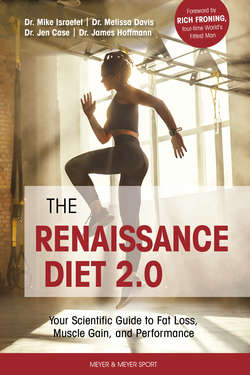Читать книгу The Renaissance Diet 2.0 - Mike Israetel, James Hoffmann - Страница 75
На сайте Литреса книга снята с продажи.
Carbohydrate Timing and Portioning
ОглавлениеCarbohydrate support immediate energy needs and glycogen synthesis up to its maximum rate. (Once you exceed immediate energy needs and glycogen synthesis rates, remaining carbs are converted to fat tissue.) Although laboratory glycogen synthesis studies have reported rates up to around 0.8 g per pound per hour (g/lb/hr), these are unlikely outside of laboratory conditions. Intakes over 0.4 g/lb/hr have been shown to exceed intestinal absorption rates. In reality, the upper limit for glycogen replenishment in individuals is probably around 0.3 g/lb/h. This means that a 150-lb. individual should not exceed approximately 50 g of carbohydrate per hour, even when doing their hardest training. If this person eats every 4 hours, 200 g of carbs per meal should be their absolute maximum. Not the most relevant limit, as that is much more carbohydrate than most people need or would eat per meal, but pertinent for timing extremes. For example, in some intermittent fasting diets, people might eat all their daily carbohydrates in one meal.
Maximum glycogen synthesis rate becomes relevant here because if you weigh 150 lb. and your daily carb allotment is 500 g of carbs and you only eat one meal, as many as 300 g of those carbs may go toward fat storage.
Because carbs are significantly anti-catabolic, their consumption in most meals is recommended in order to prevent muscle loss (figure 4.8). This is especially true on a hypocaloric diet; if smaller meals are composed of only protein, most of that will be burned for energy with little left to go toward muscle retention. Carbs are ideal as a fuel source to spare protein, and in fact your body will tend to use them preferentially for that purpose if they are co-ingested with protein.
The benefit of increasing carbohydrate intake for anti-catabolism is non-linear, however, and probably loses potency above values of 0.1 g/lb/hr. This means that our 150-lb. athlete does not likely need more than 60 g of carbs per meal for this purpose when eating every 4 hours. In contrast to protein intake, lower carbs in one meal make the musculature more sensitive to absorbing higher amounts of carbs in the next meal, so under-eating carbs in one meal can be compensated with overeating carbs in the next to a greater extent. Maximum carbohydrate intake recommendations are therefore in the range of 0.1 to 0.2 g/lb/hr, which translates to around 3.0 to 5.0 g per pound of bodyweight per day. This is the maximum amount of carbohydrates that most individuals would be able to absorb under heavy training conditions. General daily recommendations for normal training and for non-training days will be substantially lower.
Details for appropriately assigning carbs will be discussed in depth in chapter 10.
Figure 4.8 A. Eating only your needed protein at a given meal can prevent catabolism (reaches the threshold to prevent FBR; fractional breakdown rate of muscle tissue), but leaves no protein to support anabolism (reach the threshold to support FSR; fractional synthetic rate of muscle tissue). Adding carbs allows the meal to reach the needed protein and total calories to reach the FSR threshold. B. Different ratios of macronutrients in addition to protein can be consumed to reach the FSR threshold.
